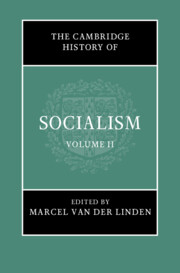Book contents
- The Cambridge History of Socialism
- The Cambridge History of Socialism
- The Cambridge History of Socialism
- Copyright page
- Contents
- Figures
- Maps
- Tables
- Contributors to Volume II
- Abbreviations
- Introduction to Volume II
- Part I Transforming State Power
- Part II Transversal Perspectives
- 26 Socialism and Colonialism
- 27 Socialism, Gender, and the Emancipation of Women
- 28 Socialism and Ecology
- 29 Crises and Futures of Social Democracy
- Index
- References
28 - Socialism and Ecology
from Part II - Transversal Perspectives
Published online by Cambridge University Press: 03 November 2022
- The Cambridge History of Socialism
- The Cambridge History of Socialism
- The Cambridge History of Socialism
- Copyright page
- Contents
- Figures
- Maps
- Tables
- Contributors to Volume II
- Abbreviations
- Introduction to Volume II
- Part I Transforming State Power
- Part II Transversal Perspectives
- 26 Socialism and Colonialism
- 27 Socialism, Gender, and the Emancipation of Women
- 28 Socialism and Ecology
- 29 Crises and Futures of Social Democracy
- Index
- References
Summary
From the end of the Second World War, the Cold War rivalry between formally communist ‘East’, and liberal democratic ‘West’ took several forms – prestige projects, such as space exploration, advances in military technology, and sporting prowess. Above all, the contest was about demonstrating the power of the rival socio-economic systems to deliver sustained economic growth, ever-rising material living standards, and consumer choice. In most western countries, there was a parallel consensus between the main parties of left and right about the central purpose of public policy. Economic growth and rising living standards were the shared priorities of both conservative and social democratic parties, with relatively minor differences over the extent of welfare provision, the role of state support for industry, and workers’ rights.
- Type
- Chapter
- Information
- The Cambridge History of Socialism , pp. 664 - 686Publisher: Cambridge University PressPrint publication year: 2022



